Can we help you?
Contact us

Can we help you?
Contact us

Thank you for contacting us
Your form has been submitted successfully Our team will contact you again as soon as possible.
Whooppss...!! An error has occurred
Try sending later or write an email directly to areaempresas@ua.es

 PATENTED TECHNOLOGY
PATENTED TECHNOLOGY
INFO
SHEET
DOWNLOAD
EXECUTIVE
ABSTRACT
CONTACT DETAILS: Research Results Transfer Office-OTRI
University of Alicante
Tel.: +34 96 590 99 59
Email: areaempresas@ua.es
http://innoua.ua.es
The University of Alicante has developed a method to transform the dynamic instruments for the determination of vapor-liquid equilibrium data into useful equipment for the determination of isobaric vapor-liquid-liquid equilibrium data by the application of ultrasound. Commercial equipment for homogeneous systems can be used for heterogeneous systems with this technique. Partners are sought to acquire the know-how and the patent rights.
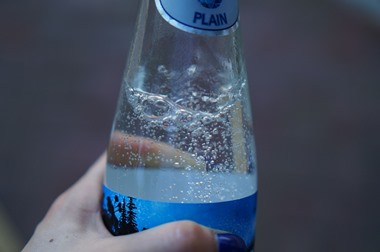
Many studies have been carried out in the heterogeneous azeotropic distillation field either by experiment or by simulation. The development of all these studies requires the use of sets of isobaric vapour-liquid-liquid equilibrium (VLLE) data. However, the number of ternary systems with experimental VLLE data is very limited since there is no standard commercial instrument to sample separately the three phases in equilibrium.
The most common methodology in the determination of the isobaric vapour-liquid- equilibrium (VLE) data is by means of some apparatus that utilise the dynamic method. However, these equipment are useful JUST when the liquid is composed by a sole phase, that is homogeneous systems.
In case of two liquid phases (heterogeneous systems), this equipment can not be used these since is not possible to reach a stationary regime. Limited mass transfer speed between the liquid phases as well as changes in the two liquid phases circulation produces important data fluctuation. In consequence, measures can not be carried out.
The technology developed by the Department of Engineering Chemistry of the University of Alicante transforms this equipment to be able to obtain equilibrium data on two phase liquid systems (heterogeneous systems). By so, the technology transforms equipment for the determination of vapour-liquid- equilibrium (VLE) data into equipment for the determination of vapour-liquid-liquid equilibrium (VLLE) data.
Using a standard equipment for the determination of the VLE in homogeneous systems, the developed method consist of applying an ultrasound bean to the liquid-liquid-vapor mix by means of an ultrasonic probe (5) coupled in a welded and communicated tube (4) to the reboiler (1). The tube (4) and probe (5) are situated in the reboiler (1) at the pipe (3) level and in contact with the mixer flask (2). An hermetic closing between the probe (5) and the tube (4) is established to avoid leaks of liquid and / or vapor as well as any acoustic energy loss to the liquid-vapor mix. Figure 1 shows this arrangement.
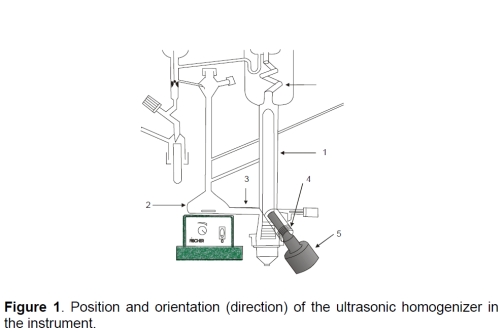
The functioning of the VLLE determination equipment is similar to the equipment without probe for homogeneous liquids but including one more parameter to be controlled. That is the ultrasound power. The ultrasound power must produce a constant emulsion in the reboiler in order to avoid the two liquid phase separation.
Samples of recirculated liquid for the two phases analysis are taken almost in the same way that when the liquid is homogeneous. In this case, samples are taken from thermostated tubes at the same temperature than in the mix vapour bubble point (measure by the apparatus ). Like this, there is time enough to the separation of two liquid phases at this temperature, sampling and analysis.
Taking samples from the vapour phase can be done after condensation if the condensed vapour produces a homogeneous liquid. In case of being heterogeneous, direct analysis of the vapour without previous condensation is the optimum procedure for the composition determination.
Figure 2 shows the experimental equipment as well as the assembly for the taking of samples in the liquid and vapour phases.
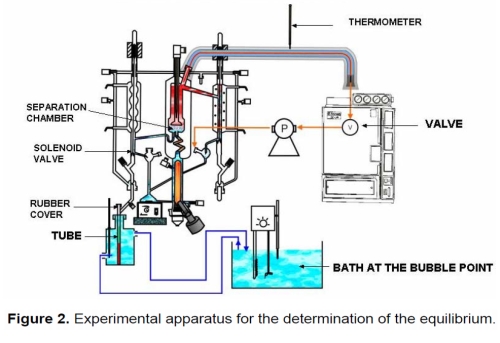
Following tables show the VLLE data from the two ternary systems determined experimentally by using this new method. Every table shows compositions (mole fractions) of the liquid and vapour phases as well as the bubble temperatures. The power supplied by the ultrasound generator to determine the VLLE data of both systems was lower than 100 watts.
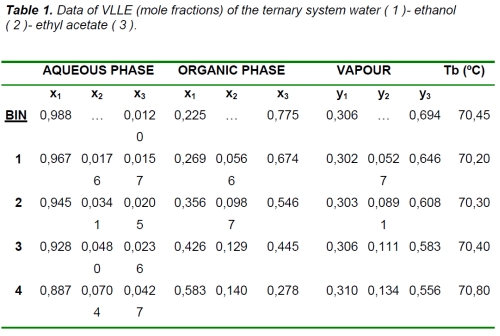
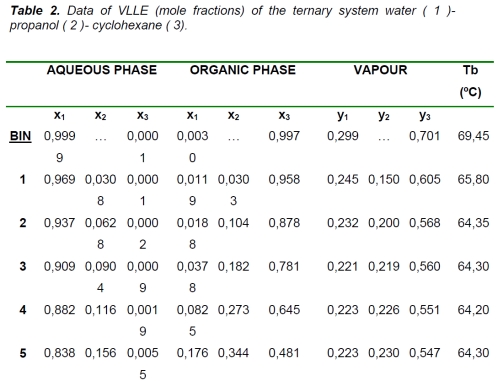
The VLLE data from both systems intended to be obtained in the original equipment Labodest WITHOUT MODIFYING it. Reliable data could not be obtained. Also for poor propanol ternary mixes of the system water-propanol-cyclohexane was impossible to determine the equilibrium due to the great system unstability where important temperature oscillations were producing (over 10ºC in some cases). Also was impossible to determine the equilibrium in the range of poor ethanol concentrations for the system water-ethanol- ethyl acetate due to the scarcity (in some null cases) of the recircultated organic phase trough the Cottrell pump.
- Ultrasound application on the VLLE determination is a new technique.
- The number of ternary systems with experimental VLLE data is very limited since there is no commercial equipment to sample separately the three phases in equilibrium. This method allows to obtain data from this systems.
- Current equipment for homogeneous systems can be used for heterogeneous systems with this method.
The method has been tested at laboratory scale after many experiments. Position and direction of the ultrasound probe has been optimised. An efficient method to produce an hermetic closing between the probe and the tube has been also established.
This method has been implemented in one of the most utilized equipment nowadays for the isobaric VLE data determination: the Labodest from Fischer Labor und Verfahrenstechnik, Germany). Applying some ultrasound beam (homogeneizador> ultrasonic homogeneizator Labsonic L –from Braun –) the original equipment is transformed to one equipment capable of the isobaric VLLE data determination in heterogeneous systems.
This new method could be applied to the manufacturing of standard equipment for the determination of isobaric VLE in both homogeneous and heterogeneous systems.
Such as equipment could be of interest for research on the VLE field. Researches working in this field which already have equipment for isobaric VLE in homogeneous systems, would be interested in having equipment also useful for isobaric VLE in heterogeneous systems.
This new method would be of interest for manufacturers of equipment for the VLE experimental determination.
The Department of Engineering Chemistry of the University of Alicante is looking for partners interested in:
- Acquiring the know-how and the patent rights to manufacture and commercialise equipment for the VLE experimental determination according to this new method.
- Establishing research and development projects in the field of phase equilibrium.
Spanish patent has been granted.
- Title: "Método y equipo para la determinación del equilibrio líquido-líquido-vapor isobárico en sistemas heterogéneos". Patente española. (1999).
- Inventors: D. Francisco Ruíz Beviá, Vicente Gomis Yagües y Juan Carlos Asensi
- Patent number: P9901574
Carretera San Vicente del Raspeig s/n - 03690 San Vicente del Raspeig - Alicante
Tel.: (+34) 965 90 9959




